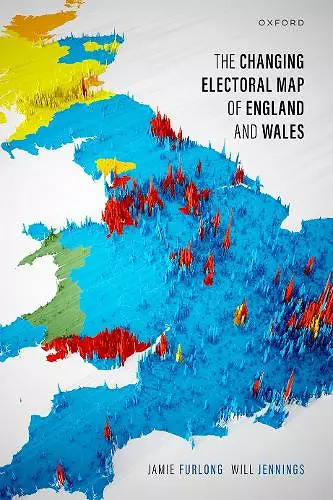The Changing Electoral Map of England and Wales
Will Jennings author Jamie Furlong author
Format:Paperback
Publisher:Oxford University Press
Published:20th Jun '24
Should be back in stock very soon

The 2019 British general election saw a dramatic redrawing of the electoral map, with the Labour Party losing seats to the Conservatives in former heartlands in the North of England and Midlands. Yet this had been a long-term shift, with the opposite trend occurring in major cities and university towns, where Labour's support has been increasing. What has driven these changes in electoral geography? Why do they matter? This book offers a definitive account of the changing electoral geography of England and Wales over the past half century. Jamie Furlong and Will Jennings argue that long-term trends in social and economic structure have significantly altered the spatial distribution of voters and, combined with changes in the parties' appeal to those voters, have led to a gradual, though recently accelerating, realignment of the geographical basis of electoral competition. Constituency-level analysis of voting at general elections between 1979 and 2019 reveals a swing from Labour to the Conservatives in demographically 'left behind' areas (areas with largely white, working-class populations and lower levels of educational attainment), while Labour's support has remained stable in areas characterized by high levels of economic deprivation and insecure employment. Areas that have experienced improvements in their socioeconomic condition - typically cities where Labour have inefficiently stacked up votes - have swung towards Labour, whereas areas characterized by economic and population decline have swung towards the Conservatives. Spatial analysis reveals clusters of seats where each party has more support than expected based on sociodemographic composition - places where, in short, place matters. In Merseyside, Labour's vote is much higher than would be predicted by demographics, while this is similarly the case for the Conservatives in Lincolnshire and parts of the West Midlands. But what makes these areas distinctive? We present qualitative case studies for Merseyside and Lincolnshire to identify the place-based, contextual factors that help explain their unusual political characteristics. The book argues for the need to recognize the importance of people, places, and parties in shaping the geography of electoral outcomes.
Under Britain's first-past-the-post electoral system, the outcome of elections depends not only on how many votes a party wins but also on how its support is distributed geographically. In this fascinating book, Furlong and Jennings uncover how the geography of party support in England and Wales has changed dramatically over the last forty years as a result of the country's transition to a post-industrial society whose consequences have varied from place to place. It is essential reading for anyone who wants to understand the long-term forces that enabled the Conservatives to win many Red Wall seats in the North of England in 2019, when, at the same time, London has become a Labour dominated city. * Sir John Curtice, Professor of Politics, University of Strathclyde and Senior Research Fellow, National Centre for Social Research *
Furlong and Jennings have provided a masterful and timely insight into Britain's electoral geography and its changes over time. Deep in explanation, nuanced in insight, its packed full of essential information, correcting overly simplistic stereotypes with authoritative analysis. Anyone who wants to understand Britain's electoral geography needs to read it. * Jane Green, Professor of Political Science and British Politics, Nuffield College, University of Oxford *
Awash with illuminating electoral statistics and maps, this is a truly excellent analysis of the changing shape of British politics. * Lord Hayward OBE, Psephologist and political analyst *
Furlong and Jennings have provided a tour de force of analysis that augments and expands on the trends around changing political identity and geography of England and Wales. This book is essential reading for those who want to understand British politics. * James Kanagasooriam, Chief Research Officer, Focaldata and inventor of the 'Red Wall' concept *
The 2019 election turned the political map on its head. This book is a must read for anyone who wants to know how party allegiances are shifting again and how that could shape and define future elections and the country. * Lisa Nandy, MP *
By moving beyond simple Red Wall / Blue Wall dichotomies with a more subtle breaking down of 'left behind' communities into three different types, this book provides an invaluable explanation as to what has happened in British politics - and provides thoughtful pointers towards what is yet to come. * Dr Mark Pack, President, Liberal Democrats *
Dramatic shifts in party support at recent British elections have substantially altered the country's political map in sometimes surprising ways. In this important new book, Jamie Furlong and Will Jennings provide a compelling analysis of how the changing social and economic geography of England and Wales over the last four decades has influenced that shifting geography of party support. Anyone hoping to understand Britain's political geography has much to learn from this book. * Charles Pattie, Professor of Geography, University of Sheffield *
They take a particular look at so-called 'left behind' places, some of which became associated with 'Red Wall' constituencies that famously switched from Labour to Conservative. The authors make a useful distinction between places that are demographically left behind with an ageing population, those economically left behind due to socio-economic deprivation and a third class of those left behind because of insecure employment (and often insecure housing tenancy). This last category of 'precariat' voters are far more likely to vote Labour than the others. It is then not surprising that two of Labour's bills announced in the King's Speech strengthen tenant and employment rights. * Roger Backhouse, Yorkshire Philosophical Society *
ISBN: 9780198927082
Dimensions: 235mm x 158mm x 13mm
Weight: 464g
272 pages